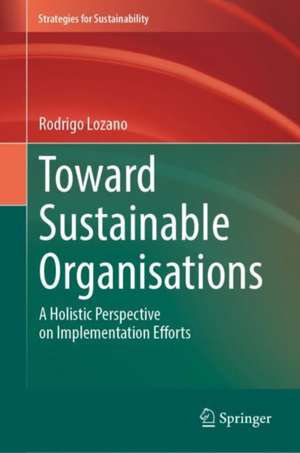Toward Sustainable Organisations: A Holistic Perspective on Implementation Efforts: Strategies for Sustainability
Autor Rodrigo Lozanoen Limba Engleză Hardback – 20 mai 2022
The book is aimed at providing a multi-level, dynamic, and holistic perspective on the contributions of organisations to sustainability. The book's uniqueness lies in analysing organisations’ efforts to become more sustainability oriented and contribute to making societies more sustainable through systems thinking, TIAs, and change processes.
| Toate formatele și edițiile | Preț | Express |
|---|---|---|
| Paperback (1) | 774.83 lei 6-8 săpt. | |
| Springer International Publishing – 20 mai 2023 | 774.83 lei 6-8 săpt. | |
| Hardback (1) | 783.98 lei 3-5 săpt. | |
| Springer International Publishing – 20 mai 2022 | 783.98 lei 3-5 săpt. |
Din seria Strategies for Sustainability
- 18%
 Preț: 784.48 lei
Preț: 784.48 lei - 18%
 Preț: 1118.30 lei
Preț: 1118.30 lei - 20%
 Preț: 481.05 lei
Preț: 481.05 lei - 18%
 Preț: 719.76 lei
Preț: 719.76 lei - 18%
 Preț: 774.83 lei
Preț: 774.83 lei - 18%
 Preț: 958.38 lei
Preț: 958.38 lei - 20%
 Preț: 752.70 lei
Preț: 752.70 lei - 15%
 Preț: 642.51 lei
Preț: 642.51 lei - 18%
 Preț: 889.29 lei
Preț: 889.29 lei - 18%
 Preț: 1232.09 lei
Preț: 1232.09 lei - 18%
 Preț: 953.35 lei
Preț: 953.35 lei - 15%
 Preț: 643.48 lei
Preț: 643.48 lei - 18%
 Preț: 1114.65 lei
Preț: 1114.65 lei - 19%
 Preț: 479.84 lei
Preț: 479.84 lei - 23%
 Preț: 605.18 lei
Preț: 605.18 lei - 20%
 Preț: 929.07 lei
Preț: 929.07 lei - 24%
 Preț: 632.64 lei
Preț: 632.64 lei - 15%
 Preț: 642.83 lei
Preț: 642.83 lei -
 Preț: 395.33 lei
Preț: 395.33 lei - 18%
 Preț: 901.74 lei
Preț: 901.74 lei - 18%
 Preț: 1389.15 lei
Preț: 1389.15 lei - 15%
 Preț: 641.71 lei
Preț: 641.71 lei - 18%
 Preț: 779.26 lei
Preț: 779.26 lei - 24%
 Preț: 793.38 lei
Preț: 793.38 lei - 15%
 Preț: 635.15 lei
Preț: 635.15 lei
Preț: 783.98 lei
Preț vechi: 956.08 lei
-18% Nou
Puncte Express: 1176
Preț estimativ în valută:
150.03€ • 156.06$ • 123.86£
150.03€ • 156.06$ • 123.86£
Carte disponibilă
Livrare economică 24 martie-07 aprilie
Preluare comenzi: 021 569.72.76
Specificații
ISBN-13: 9783030996758
ISBN-10: 3030996751
Pagini: 144
Ilustrații: XVI, 144 p. 62 illus., 56 illus. in color.
Dimensiuni: 155 x 235 mm
Greutate: 0.5 kg
Ediția:1st ed. 2022
Editura: Springer International Publishing
Colecția Springer
Seria Strategies for Sustainability
Locul publicării:Cham, Switzerland
ISBN-10: 3030996751
Pagini: 144
Ilustrații: XVI, 144 p. 62 illus., 56 illus. in color.
Dimensiuni: 155 x 235 mm
Greutate: 0.5 kg
Ediția:1st ed. 2022
Editura: Springer International Publishing
Colecția Springer
Seria Strategies for Sustainability
Locul publicării:Cham, Switzerland
Cuprins
Chapter 1. Introduction.- Chapter 2. Sustainable Development and Sustainability.- Chapter 3. Organisations and their contribution to sustainability.- Chapter 4. Tools, initiatives, and approaches used for implementing sustainability.- Chapter 5. Organisational change management for sustainability.- Chapter 6. Civil Society Organisations’ contributions to sustainability.- Chapter 7. Contributions by Corporations to sustainability.- Chapter 8. Public Sector Organisations’ contributions to sustainability.- Chapter 9. Towards more sustainable organisations: Discussions and Conclusions.
Notă biografică
Rodrigo Lozano is a Professor of Organisational Sustainability at the University of Gävle, Sweden. He is a field leader in this area and has been working towards Sustainability in NGO's, universities, and corporations for over twenty years. Prof. Lozano is a Series Editor of Springer's Strategies for Sustainability book series.
Textul de pe ultima copertă
The book is one of the first ones focussing on how organisations (civil society, corporations, and public sector ones) are contributing to sustainability. The book starts by providing a discussion of the four dimensions of sustainability (economic, environmental, social, and time). The second chapter focusses on what organisations are, their system elements (e.g. operations and production, management and strategy, and governance), stakeholders, relationships within and between organisations (ranging from competition to collaboration), and a framework for organisations to understand and map how they can contribute to sustainability. The third chapter discusses the twenty-four main tools, initiatives, and approaches (TIAs) that have been developed for organisations to contribute to sustainability, such as Circular Economy, Corporate Social Responsibility, Environmental Management Systems, and Sustainability Reporting. The fourth chapter focusses on organisational change management for sustainability, including types of change, drivers for change, resistance to change, incorporation, and institutionalisation. The fifth chapter presents empirical evidence on what civil society organisations have contributed to sustainability, from priorities and impacts, TIAs, external stimuli, and internal factors, drivers for change, starts of change, and development of change. The sixth chapter presents empirical evidence on what corporations have contributed to sustainability, from priorities and impacts, TIAs, external stimuli, and internal factors, drivers for change, starts of change, and development of change. The seventh chapter presents empirical evidence on what public sector organisations have contributed to sustainability, from priorities and impacts, TIAs, external stimuli, and internal factors, drivers for change, starts of change, and development of change. The last chapter provides the conclusions of the book.
The book is aimed at providing a multi-level, dynamic, and holistic perspective on the contributions of organisations to sustainability. The book's uniqueness lies in analysing organisations’ efforts to become more sustainability oriented and contribute to making societies more sustainable through systems thinking, TIAs, and change processes.
Caracteristici
Analyses organisations' efforts to become more sustainability-oriented Looks at cases across civil society, the public sector, and corporations Utilizes a Tools, Initiatives, and Approaches framework
